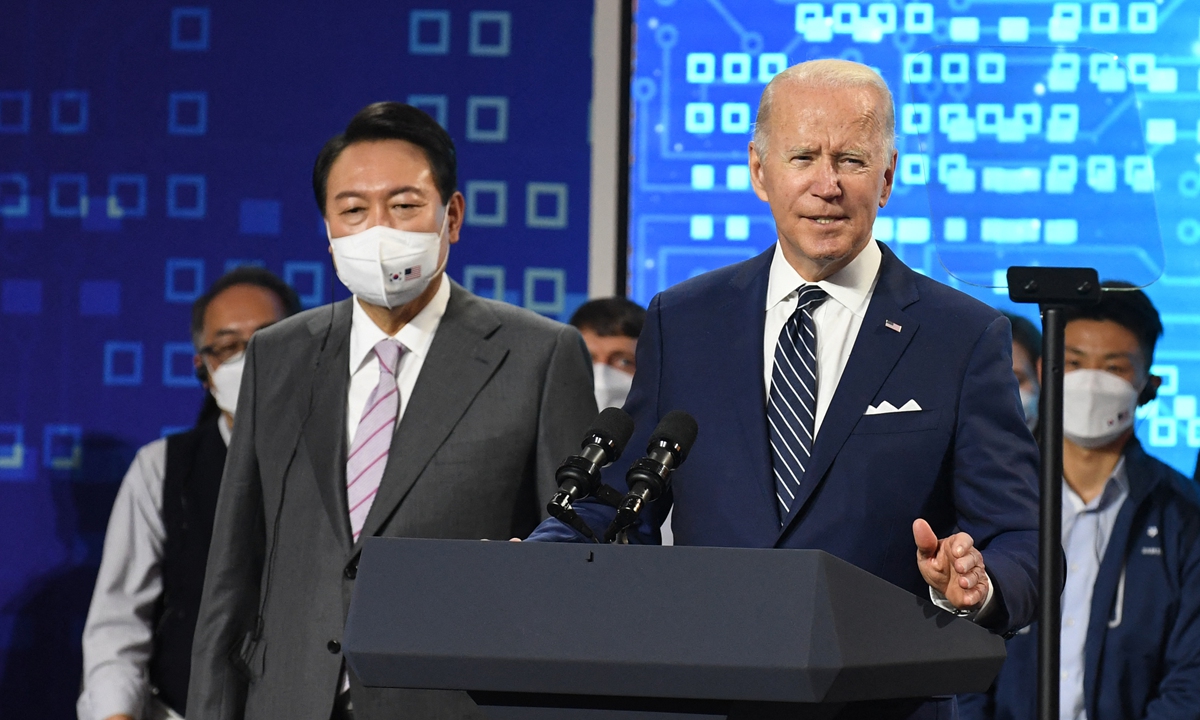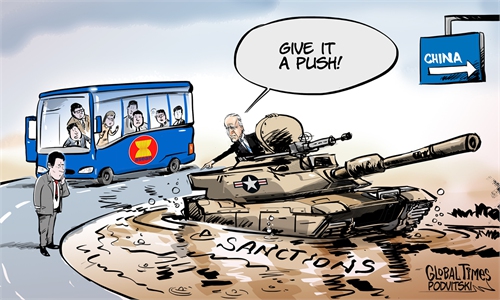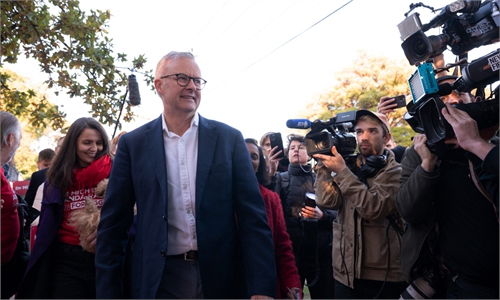
US President Joe Biden (right) speaks with South Kroean President Yoon Suk-youl during a press conference after visiting the Samsung Electronic Pyeongtaek Campus in Pyeongtaek, South Korea, on May 20, 2022. Photo: AFP
The Saturday meeting between visiting US President Joe Biden and his new South Korean counterpart Yoon Suk-yeol in Seoul has turned out to be quite troubling, as the two countries agreed to hold bigger combined military drills and deploy more US weapons including nuclear ones if necessary to boost the deterrence against the so-called evolving threat posed by North Korea, and clamored to what they called maintain peace and stability in not only the Korean Peninsula but also the rest of Asia and the world.Chinese observers reached by the Global Times on Sunday warned that such agreements would only achieve the opposite and further intensify the crisis on the Korean Peninsula by breaking a complicated and delicate balance in the region which could lead to a catastrophic aftermath that Seoul cannot afford.
According to the official White House release of the US-South Korea leaders' joint statement following their meeting, Biden affirms the US' "extended deterrence commitment" to South Korea using the full range of US defense capabilities, including nuclear, conventional and missile defense capabilities.
Biden and Yoon also agreed to expand the scope and scale of combined military exercises and training on and around the Peninsula, read the release. Many believe that an enhanced US-South Korea military cooperation would no doubt anger North Korea as Pyongyang views the drills as rehearsals for invasion. The combined military drills had been scaled back under the outgoing President Moon Jae-in in recent years over COVID-19 and efforts to lower tensions with North Korea and resume talks to rid the peninsula of nuclear weapons.
Lü Chao, an expert on the Korean Peninsula issue at the Liaoning Academy of Social Sciences, said that Pyongyang would of course view these moves as new provocations, as it regards US-South Korea military drills as a barometer to determine the situation on the Peninsula and the attitude Seoul is taking on.
They also reaffirmed the commitment of the US to deploy strategic US military assets in a "timely and coordinated manner as necessary," read the joint statement.
"The strategic US military assets would typically include missiles for defensive purposes as well as those of an offensive nature, nuclear submarines and aircraft carrier groups, and the list would also include assets the US military has stationed in the Asia-Pacific ocean and even all over the world," Zheng Jiyong, director of the Center for Korean Studies at Fudan University in Shanghai, told the Global Times.
It might also include the new-type of Terminal High Altitude Area Defense, or the notorious THAAD system, Zheng said, noting that by using deterrence against North Korea as excuse, the US is forming South Korea the new front to reinforce its scheme of "countering China."
Once those weapon and assets were deployed to South Korea, the balance of strength on the Korean Peninsula will be broken, which would inevitably lead to a fierce arms race on the peninsula, Zheng warned.
The two agreed to reactivate the high-level Extended Deterrence Strategy and Consultation Group (EDSCG) "at the earliest date." The EDSCG was launched in 2016. But talks have not been held since 2018, as both South Korea and the US then worked on holding a summit with North Korea, the South Korean Yonhap News Agency reported.
Chinese analysts said the idea of rebooting the mechanism signals that Yoon's administration considers addressing the Korean nuclear crisis as top of its agenda and the most urgent task for the sake of South Korea's security.
However, they warned that the return of the EDSCG would intensify the situation, and Seoul in fact would lose control if it is dragged into an imbalanced aftermath and can only rely on the US.
Observers said Yoon, who is keen to play a bigger role in regional issues, should understand that the more complicated the Korean Peninsula situation gets, the less autonomy and control Seoul could actually command, and he should not turn South Korea into a pawn in the US' anti-China "Indo-Pacific Strategy" and hurt the feelings of its top trading partner.
Biden stressed during his meeting with Yoon that "our joint commitment to the freedom of South Korea and our firm opposition to changing borders by force has flourished with decades of peace and cooperation," according to another White House release of the event.
The remarks have been widely seen as an apparent reference to Russia's military operation in Ukraine and the Taiwan question for China, Reuters reported on Saturday.
The joint statement said that Yoon and Biden "reaffirm their commitment to maintain peace and stability, lawful unimpeded commerce, and respect for international law including freedom of navigation and overflight and other lawful use of the seas, including in the South China Sea and beyond" and that "the two presidents reiterate the importance of preserving peace and stability in the Taiwan Strait as an essential element in security and prosperity in the Indo-Pacific region."
By saying so, Biden is deliberately cooking and selling Russia/China-threat theories and putting South Korea in the boots of Ukraine to get the "sense of historic suppression." Washington wants to hypnotize countries like South Korea to support interference in the Taiwan question, Zheng commented.
Observers noted that the US is roping in as many as allies using the Ukraine crisis and South Korea also wants its share, but the Taiwan question is totally different and is purely China's domestic affair. The US' attempt to internationalize the issue by comparing it to the Ukraine crisis is delusional and doomed to fail.
Disliking the idea of a new Cold War, which is a primary goal of Biden's trip to Asia this time, residents of Seoul organized spontaneous rallies to protest the US president's visit. According to CGTN footage, some of the protesters held signs that read "Biden's intensifies war crisis" and "oppose Yoon Suk-yeol's participation in the new US Cold War."
The protesters said they believed the situation on the Korean Peninsula is escalating and that their government should not intensify initiatives such as US-South Korea military cooperation and certain aggressive military strategies, but should instead choose peace and cooperation.




